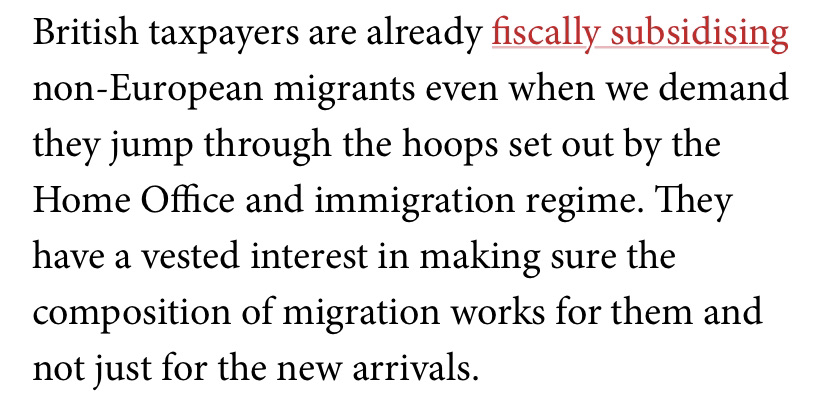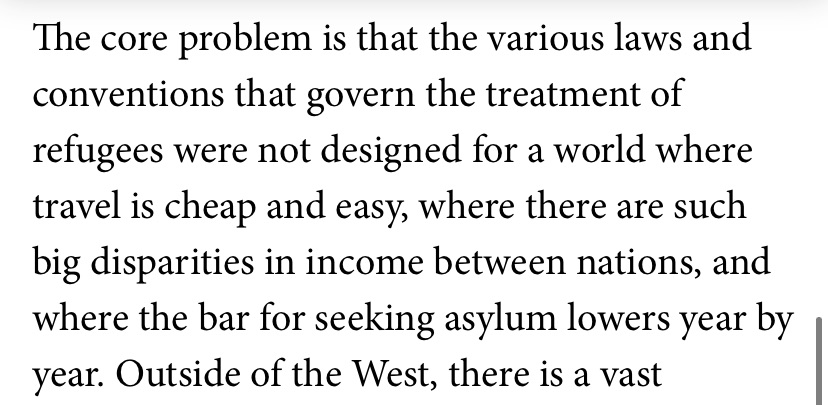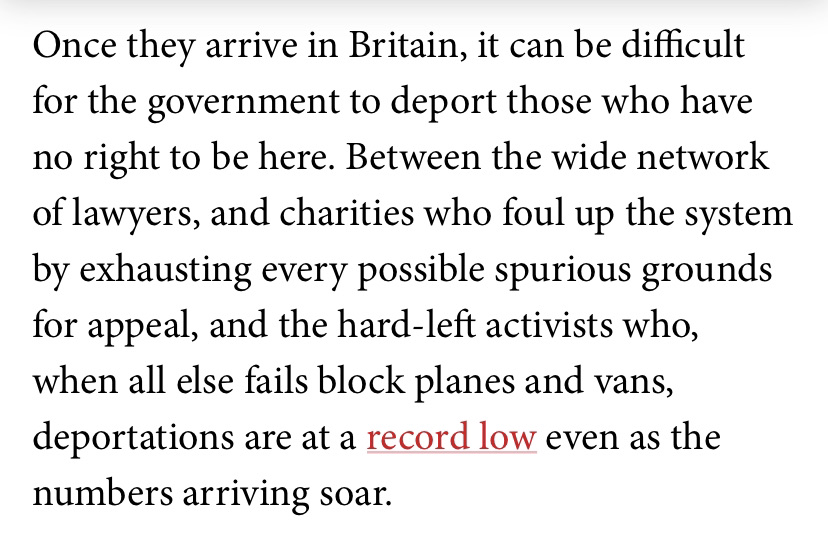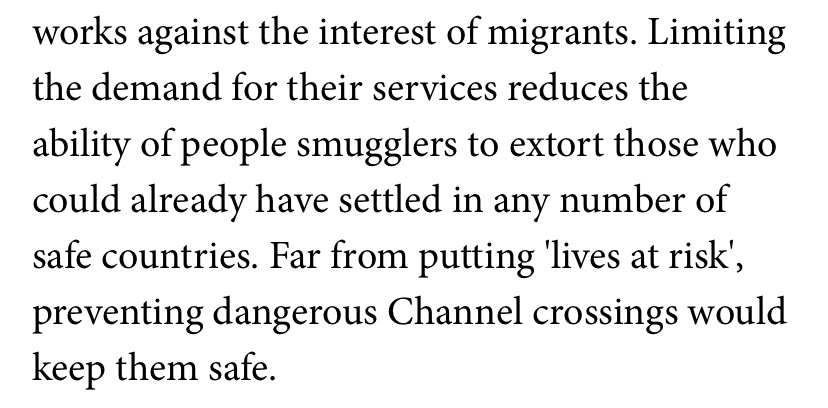
Recent years have led many of us to question what we once felt about this country. But one thing I do believe is that most people, whether here or elsewhere, feel instinctive compassion for those in need when they are not being subjected to a drip feed of propaganda.
But the drip feed of propaganda is what we are, sadly, subjected to. With transportations to Rwanda imminent, this article in The Spectator is just one of hundreds you could have read over the last few years that have led inexorably to where we are today.
Along with accompanying tweets by the same author, it deploys all the usual tricks to persuade the reader that what’s deeply immoral is somehow entirely moral, even compassionate. What follows is a dissection of some of those tricks.
Firstly, it does its best to dehumanise all those who reach our shores through unorthodox means, using a variety of techniques.
Technique no. 1 is to destroy any notion of individuality, deliberately creating the impression that all these fellow humans of ours are one great homogenous mass rather than individuals each with his or her own story to tell.
According to this tweet, for example, “Britain is a country they have no connection to”. That’s right, the author feels able to assert baldly that not a single one of these asylum seekers has any connection to this country.
The truth of course, is many of them have a very strong connection to Britain, by virtue of family ties here and our colonial legacy, part of which is the English language that so many speak and that not unreasonably attracts them to this country.
(Underlying this assertion of the author’s is the implied subtext, wholly erroneous, that all refugees want to come to Britain and that Britain takes far more than its fair share of refugees).
Still on technique no. 1, in the body of the article (and note the sarcasm): “we are constantly told (asylum seekers) are “innovators, entrepreneurs, taxpayers”.

There you have it. They ALL need to prove their worth to the economy, rather than prove that they deserve compassion after escaping war or persecution. Refugee? What’s a refugee?
Dehumanising technique no 2 is the deliberate conflation of legitimate asylum seekers with economic migrants, so that the reader gains the impression of there being no real difference (and yes, of course it’s not always clear-cut, but that’s why we have laws and a system).
So an article ostensibly about asylum seekers talks about border control and migrants more broadly, and the British people’s “interest in making sure the composition of migration works for them”.

You have to remind yourself that we’re supposed to be talking about our duties towards people in need of sanctuary.
But that’s the whole point . The article, like so much public discourse, turns on its head the whole asylum debate, so that rather than being one about giving sanctuary to those in need, it becomes one about the benefits to the British people.
In this article, bizarrely, it’s even about the economic benefits to Rwanda (an entirely legitimate objective for an aid programme but an entirely illegitimate one for an asylum policy).
Here’s dehumanising technique no 3. Insofar as there is any acknowledgement of the obligation of safe countries to give sanctuary to refugees, it becomes a question of guaranteeing their physical security and nothing more.
The implication, in all the arguments about the benefits of the enforced transportation of people to Rwanda, is that the mental health of people already traumatised by war and persecution, and by extremely perilous journeys to reach our shores, is not the Government’s concern.
So what if they kill themselves or fall into severe depression? That’s their problem, not ours, you can almost hear these people say. It’s not our job to care about them.
And then there’s dehumanising technique no 4, which is to deny asylum seekers any agency at all. In the most extraordinary, and offensive, passage of all, we’re told “the programme must surely rank among the most generous development aid schemes ever devised” (ie for Rwanda).

The problem is, to be not only effective but legitimate, a development aid scheme should have as a given the willing participation of all parties.
This particular “development aid scheme” has at its core the enforced transportation, with financial sweeteners to Rwanda, of our fellow human beings.
This particular “development aid scheme” is a business transaction, in which the “product” changing hands, against its will, is our fellow human beings.
Not content with dehumanising the individuals, the author also has a go at the system. The problem is that “the various laws and conventions that govern the treatment of refugees were not designed for a world where travel is cheap and easy…

… where there are such big disparities in income between nations, and where the bar for seeking asylum lowers year by year” (not sure of the evidence for this last point).
And there was I, in my naivete, imagining that the system was designed – in the shadow of the unspeakable atrocities of the Second World War – for a world in which terrible things happen to people, and in which those of us who are able to help should do so. It never occurred to me that the people who wrote the rules were privately confident they’d never be needed because back then travel was so darned expensive, and we were all equally wealthy anyway so there was no need to flee persecution as long as you had a nice house.
A part of “the system”, of course, is those meddlesome lawyers and charities, who “foul up the system by exhausting every possible spurious grounds for appeal”. Translation: “who seek to ensure law is applied and individual rights are understood, using every legitimate means”.

Just for good measure, the author complains that, thanks to all these do-gooders, “deportations are at a record low”. It’s almost as if the whole problem has been exaggerated, and as if the majority of people who arrive eventually turn out to be legitimate asylum seekers.
The author’s not done yet. In another tweet, he says that the fact these people have transited multiple safe countries to get here means that what they’re doing is “economic migration”.
Except that it doesn’t mean that. It means that they’re asylum seekers, exercising their right to seek asylum in the UK under international refugee law. What’s more, now we’ve left the EU and are no longer party to the Dublin Convention, there’s much less we can do about it.
Just to make us feel OK about all this, we’re reassured there’s no need to worry. Because, although they don’t yet know it, when we ship people to a place they don’t want to go, we’re (whisper it) actually BEING KIND TO THEM. And as a bonus, we’re being kind to Rwanda too.
Not only that, but by limiting the demand for people smugglers’ services, we’re reducing their ability “to extort those who could already have settled in any number of safe countries”. No matter that there’s not a shred of evidence for this as long as it sounds plausible, eh?

Let’s give the writer the benefit of the doubt and accept that this MAY not be about racism, although that really only stands up to scrutiny if he would be happy to send Ukrainians to Rwanda.
Ukrainians who also have no connection to this country, and who have also crossed several other countries to get here. I suspect the writer wouldn’t be happy to do that (and nor should he be, for Ukrainians or any other nationality).
But that still leaves the immorality point. Of course nobody wants to believe that the policy they support is immoral – better to tell yourself not only that it’s entirely moral, but that it’s moral in a way that is too complex for all those hard-left activists to understand.
But immoral is what it is. Disgustingly immoral. And I can think of a good few other words to. Reprehensible. Cruel. Unspeakable. Beyond the pale. And utterly, utterly shameful.
You can see what’s happening here. The fraying thread linking us to what asylum policy SHOULD be about – our common humanity – rather than what some choose to make it about, is being twisted and twisted to the point where it is about to snap.
Where will it leave this country when that thread does finally snap, making a noise as it goes that sounds something like “Rwanda”? It will leave us lost, without a soul, wondering what has become of us and whether we’ve ever really been what it is we thought we were.





